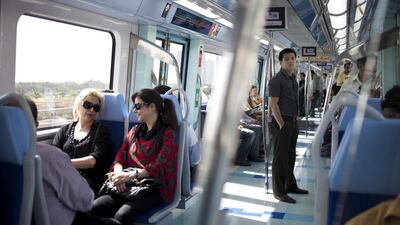DUBAI // Tens of thousands of people are expected to take part in the annual Car-Free Day campaign, riding bikes or public transport to work.
On February 21, Dubai residents will be urged to use buses and the Metro to cut carbon emissions and for a healthier lifestyle. The National will run a week of special reports in the lead-up to the big day.
“It’s a good idea and I think more people would end up using the Metro, for example, but I think they should provide more trains to cope with demand,” said Louis McMillan, 26, from Australia.
“The Metro is always packed whenever I use it and sometimes it can be very difficult to find a seat, but it shows how popular it has become.”
Sarah Fernandes, 30, from the Philippines, said more streamlined bus routes would help to make them more popular.
“I’ve gone on a few buses but the problem is that it takes too long to get to the destination,” Ms Fernandes said.“The drivers always take very convoluted routes around side streets and I think that puts many people off.”
She uses the Metro more often on the weekends but still prefers to drive her car to and from work, as it is more convenient.
“We have office parking where I work in Business Bay so I don’t have to worry about all that, but I would think about using my car less in future,” Ms Fernandes said.
Lower petrol prices mean many motorists do not have a financial incentive to switch to public transport, she said.
“I’ve noticed that the there tends to be much more congestion on the roads now, which makes the commute to and from work longer,” she said.
“If people opt for public transport they will see how much quicker it is, and maybe that will encourage them to use their cars less often.”
Indian Sanjeet Patel, 38, said that if the campaign were expanded it could encourage more people.
“If they had some kind of offer where they had a car-free month or fortnight and made public transport cheaper, then you could get more people hooked that way,” Mr Patel said.
“For many people, myself included, we are stuck in old habits about using cars to go everywhere. But by having a longer campaign it would be more in the public eye and people would know about the alternatives.
“I think there is an impression among many Dubai residents that the Metro is something that tourists use, but it’s for everyone.”
The municipality says 300 organisations and about 30,000 people opted to use public transport on Car-Free Day last year.
Only two organisations took part in the inaugural campaign in 2010, meaning only 1,000 vehicles were left in their garages.
About 147,000 litres of fuel has been saved over each of the six events.
People can register through the municipality website, dm.gov.ae. Car-Free Day is open to people and organisations.
Website visitors can also use the carbon-saving calculator to work out how much pollution they will save if they leave their car at home.
The campaign can be followed on social media at #DubaiCarFreeDay, and for more information about how to take part, email carfreeday@dm.gov.ae.
nhanif@thenational.ae

